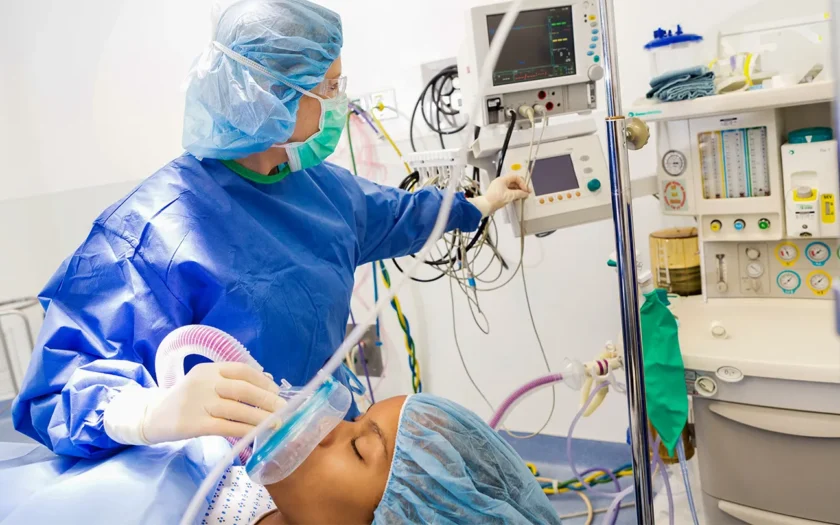Short-term hiccups (for example, after drinking carbonated drinks, eating hot food) are normal, pathological hiccups indicate diseases of internal organs and require treatment.
What are hiccups?
Hiccups are sudden and involuntary contractions of the diaphragm. They are accompanied by a sharp closure of the vocal slit, causing a characteristic sound “hiccup”. Diaphragm – the main respiratory muscle dome located between the thoracic and abdominal cavities. Normally, it contracts on inhalation, dropping down and increasing the volume of the rib cage to fill the lungs with air, and relaxes on exhalation, returning to its original position. The diaphragm is regulated by the respiratory center of the brain and nerves, ensuring rhythmic breathing.
What are the symptoms of hiccups?
Hiccups are felt as sudden and repetitive jolts in the thoracic and abdominal regions. Diaphragm contractions may be accompanied by a slight squeezing or discomfort in the chest and abdomen due to muscle tension (especially during inhalation), as well as breath-holding. Sometimes it may interfere with breathing or speech, creating a sense of embarrassment. Prolonged hiccups may be accompanied by additional symptoms including fatigue, throat irritation, difficulty breathing and eating.
Types of Hiccups
Hiccups are categorized according to the duration and frequency of attacks. Short-term hiccups last a few seconds or minutes, constant – more than 48 hours for one month, difficult to treat – longer than a month. Separately distinguish chronic hiccups, which is characterized by periodically recurring attacks that last more than a few minutes. There are also four main types of hiccups, depending on the cause of its occurrence.
| Types of hiccups | |
| Type | Characteristics |
| Central | Hiccups occur due to damage to the central nervous system (for example, against the background of a stroke, tumor, meningitis or multiple sclerosis). With diseases and pathologies, there is a disorder in the respiratory centers of the brain, leading to persistent and persistent hiccups. It is often accompanied by neurologic symptoms including headaches, paralysis or limb cramps. |
| Peripheral | Caused by irritation of the peripheral (vagus or diaphragmatic) nerves that control the diaphragm. Causes include inflammatory processes (pleurisy, pericarditis), chest trauma, or nerve compression (squeezing) by a tumor. Hiccups can be prolonged, often associated with pain in the affected area, and respiratory disturbances (e.g., shortness of breath). |
| Reflexive | Hiccups appear as a reflex reaction to diseases of the internal organs, including diseases of the stomach, gallbladder or liver. Hiccups occur due to activation of nerve reflexes that transmit a signal from the affected organ to the diaphragm. Hiccups are most often temporary, but may recur when the disease worsens, sometimes accompanied by nausea, abdominal pain or bitterness in the mouth. |
| Toxic | Develops with exposure to toxins: alcohol, chemicals or drugs (anesthetics, corticosteroids). Toxins disrupt the normal operation of respiratory centers or cause irritation of the nerves involved in the process of breathing. May be accompanied by signs of intoxication: dizziness, weakness or loss of coordination. |
Why does a person hiccup?
Hiccups can be physiological (occur in response to temperature changes, alcohol or tobacco smoke) or pathological (develop as a result of disease or injury). To overcome hiccups caused by chronic diseases of internal organs, a doctor will help. To determine the cause of severe hiccups, you need to consult a general practitioner.
Causes of temporary hiccups
Hiccups can start and stop for no reason. Possible causes of temporary hiccups are:
- smoking tobacco or cannabis;
- sudden temperature changes;
- drinking alcohol or carbonated beverages;
- eating food that is too hot or cold;
- excessive anxiety, worry, or fear;
- physical or psychological stress.
Hiccups after eating in adults are due to irritation of the diaphragm, which can be caused by overeating, eating too fast, or swallowing air (aerophagia). These factors increase the volume of the stomach, leading to pressure on the diaphragm and activation of the vagus nerve. Consumption of hot and spicy food and carbonated drinks can also provoke spasms of the diaphragm, causing hiccups after eating.
Smoking hiccups are caused by irritation of the vagus nerve and diaphragm as a result of inhaling tobacco smoke. Smoke contains chemicals that can provoke inflammation of the mucous membrane of the esophagus and stomach, causing reflex contractions of the diaphragm. In addition, smoking promotes the entry of air into the stomach, which can also cause hiccups in an adult.
The cause of hiccups at night may be staying in a supine position, during which the pressure on the diaphragm increases due to a full stomach or increased gas formation. Hiccups in sleep are often associated with reflux of stomach acid, which can irritate the esophagus and diaphragm, especially if the person sleeps on their back. Although breathing normally slows down in sleep, nerve impulses to the diaphragm can be disrupted by external factors (e.g., chronic stress, alcohol exposure).
Causes of Persistent Hiccups
Prolonged hiccups in the elderly can occur due to decreased tone of the nervous system, which increases susceptibility to stimuli that cause contractions of the diaphragm. Causes of prolonged hiccups:
- uncontrolled or prolonged medication (e.g., dopamine agonists, benzodiazepines, anesthetics, corticosteroids);
- procedures and surgeries with a history of anesthesia;
- electrolyte imbalance (e.g., elevated potassium or sodium levels);
- gastrointestinal diseases (including gastritis, ulcerative or gastroesophageal reflux disease);
- central nervous system pathologies (Parkinson’s disease, multiple sclerosis);
- brain damage (e.g., due to trauma or tumor);
- lung disease (pneumonia, pulmonary embolism, or pleurisy);
- metabolic disorders (e.g., high or low blood calcium levels, uremia);
- uncontrolled type 1 or type 2 diabetes mellitus;
- severe kidney disease (e.g., failure);
- infectious diseases (influenza, shingles, and herpes simplex);
- cancer of the mediastinum, esophagus, or pancreas.
Hiccups in stroke are caused by irritation or damage to nerve structures involved in regulating breathing and diaphragm function (such as the medulla oblongata). Stroke can impair the functioning of the vagus nerve or respiratory centers, leading to frequent hiccups due to uncontrolled contractions of the diaphragm.
In oncology, hiccups may be caused by the growth of a malignant tumor that squeezes nearby organs, disrupting their function, or causes inflammation in the surrounding tissues. Metabolic disorders (e.g., hypercalcemia), irritation of thoracic and abdominal organs, and side effects of chemotherapy may also be causes of frequent hiccups in cancer.
Causes of hiccups in children
Fetal hiccups are a normal physiological process and can occur due to the development and training of the nervous system. In utero, hiccups are associated with reflexes that are activated in response to involuntary contractions of the diaphragm. Hiccups may also provide evidence that the diaphragm and respiratory system of the fetus are beginning to develop and prepare for breathing after birth.
Frequent hiccups in a baby are often due to immaturity of the nervous system and diaphragm, resulting in involuntary contractions. Hiccups in newborns can be caused by rapid feeding, overeating, or swallowing air, which irritates the stomach and diaphragm. Frequent hiccups in an adolescent may be caused by hormonal changes, rapid growth, and the development of the diaphragm and nervous system, which do not yet fully control respiratory movements.
How do you stop the hiccups?
To pass hiccups, you need to do some breathing exercises: hold your breath for a few seconds, quickly and rhythmically inhale and exhale into a paper bag. Other remedies for hiccups at home:
- drink a few sips of cold water;
- gently pull the tip of your tongue;
- rinse your throat with ice water;
- eat one spoonful of sugar or some fresh ginger;
- drink a glass of warm water with honey;
- sit down and lean forward on your knees.
A folk remedy for hiccups is lemon, which works by stimulating the taste buds, activating the vagus nerve and helping to interrupt reflex spasms of the diaphragm. The acid and pungent flavor of lemon can trigger a strong nervous response, helping to stop hiccups. The acid can also help improve digestion by reducing the irritation that causes hiccups.
Gently applying pressure to the eyes can help relieve hiccups quickly. The gentle pressure stimulates the vagus nerve, which is involved in controlling the contractions of the diaphragm. The method acts as a “reset” of the nerve pathways, reducing the frequency of spasms and helping to stop hiccups.
What to do in case of hiccups in newborns?
Hiccups in infants occur due to the immaturity of the nervous system and diaphragm, which leads to its involuntary contractions. In a newborn, hiccups can occur after feeding in case of overeating or swallowing large amounts of air. Tips that can help with hiccups in newborns:
- take breaks in feeding to regurgitate;
- rub the back to stop infant hiccups;
- let your baby suck on a pacifier.
The following will help relieve hiccups in an infant after feeding: sit the baby upright. This position promotes proper positioning of the stomach and reduces pressure on the diaphragm. However, hiccups in newborns usually pass on their own, parents do not have to do anything.
When should I see a doctor for hiccups?
A doctor can help you get rid of hiccups after determining the type and cause of excessive contractions of the diaphragm. To stop hiccups in a child it is necessary to contact a pediatrician, in an adult – to a general practitioner or family doctor. In case of suspected disorders of the central nervous system, the doctor will refer to a neurologist, gastrointestinal diseases – to a gastroenterologist.
How is hiccup diagnosed?
Regular attacks of uncontrolled contractions of the diaphragm or hiccups all day long are an indication to consult a general practitioner. At the initial appointment, the doctor will analyze the complaints, collect a history, asking questions about the presence of other symptoms, chronic diseases, injuries or surgeries. Diagnosis of hiccups may include:
- neurological assessment. This may include assessment of balance and coordination, muscle strength and tone, reflexes, vision and touch. A neurologic evaluation will help suspect lesions of the brain, nerve pathways, or spinal cord. Mandatory if vagus nerve damage, stroke, tumors or other diseases affecting the nervous system are suspected;
- blood tests. Will show signs of infections, inflammation, metabolic disorders or electrolyte imbalances. For example, changes in glucose or potassium levels may indicate hiccup-causing conditions, including diabetes or kidney failure;
- chest x-rays. Will help rule out lung or heart disease, including pneumonia, tumors, or airway problems that may be putting pressure on the diaphragm. X-rays can also help identify a bulky mass that can interfere with the normal function of the diaphragm;
- electrocardiography (ECG). Shows the electrical activity of the heart and can help identify heart rhythm abnormalities, including tachycardia, bradycardia, and signs of hypoxia (lack of oxygen). An ECG also helps rule out heart problems (such as myocardial infarction or an overloaded heart) that may accompany hiccups;
- endoscopy. Helps the doctor examine the mucous membrane and detect abnormalities that may be the cause of prolonged or chronic hiccups. Endoscopy can detect diseases of the digestive organs, including gastritis, ulcers, reflux, inflammation or tumors of the esophagus, stomach and duodenum.
Abdominal computed tomography examines the digestive organs to look for abnormalities, including tumors, inflammation, or infections that may be pressing on the diaphragm and causing hiccups. Magnetic resonance imaging of the brain can help identify damage or abnormalities in the brain (e.g., tumors, strokes, inflammation) that may affect the nerve pathways that control the diaphragm.
Treatment methods for persistent hiccups
A doctor can help get rid of prolonged hiccups after determining the underlying cause (disease, pathology, or injury) that is causing the symptom. Drugs for hiccups:
- hiccup remedies that reduce the activity of the vagus nerve (anticholinergics). These drugs block the transmission of signals along the vagus nerve, which controls diaphragm contractions. Prescribed for hiccups associated with diseases that irritate the vagus nerve (e.g., gastroesophageal reflux, tumors in the chest or diaphragm);
- anticonvulsants. Relax the transverse striated muscles, including the diaphragm, by acting on receptors in the central nervous system. Drugs help relieve central hiccups caused by lesions of the nervous system (stroke, brain injury, brain tumors);
- drugs that reduce stomach acidity (proton pump inhibitors). Reduce the production of gastric acid, protect the esophageal mucosa from irritation and reduce the reflex effect on the vagus nerve. They are prescribed for gastroesophageal reflux disease or peptic ulcer disease;
- antiemetics. They stimulate the motor function of the stomach, accelerating its emptying, and reduce the effect of irritants on the vagus nerve. They also have a central action, suppressing reflex spasms. Prescribed for hiccups associated with impaired gastric motility, gastroparesis or inflammation of the esophagus;
- antipsychotics. Affects the central nervous system by blocking dopamine receptors in the area responsible for the regulation of respiratory reflexes. They are prescribed for persistent hiccups associated with neurological and metabolic disorders (hypocalcemia, renal failure).
A nerve block may be prescribed to treat hiccups, which helps temporarily eliminate irritation or hyperactivity of the nerve pathways that control diaphragm contractions. The injections help prevent prolonged and painful spasms, especially if the hiccups are caused by diseases affecting the nervous system or organs associated with the vagus nerve.
What is the danger of hiccups?
Short-term hiccups are not dangerous because they go away on their own and do not lead to the development of consequences. Prolonged hiccups can lead to breathing, swallowing and speech difficulties, sleep disturbances and loss of energy, as well as gradual weight loss.
Can hiccups be prevented?
To prevent pathological hiccups, timely treatment of chronic diseases that can cause involuntary contractions of the diaphragm will help. Prevention of short-term hiccups:
- taking medications only as prescribed by a doctor;
- slow consumption of food and drinks;
- limiting the use of carbonated and alcohol-containing drinks;
- avoiding eating too hot or cold food;
- limiting spicy foods in the diet;
- eating small meals to avoid overeating;
- avoiding active and passive smoking.
To prevent diseases of the central nervous system and internal organs that can cause hiccups, you should eat a balanced diet, get regular physical activity, and get checkups. It is also important to protect your head from damage (for example, by wearing a hard hat at work or a helmet when playing sports).



